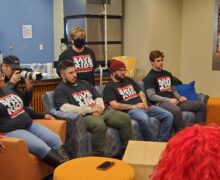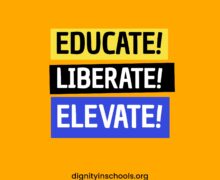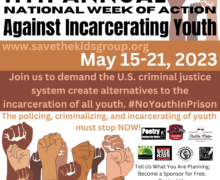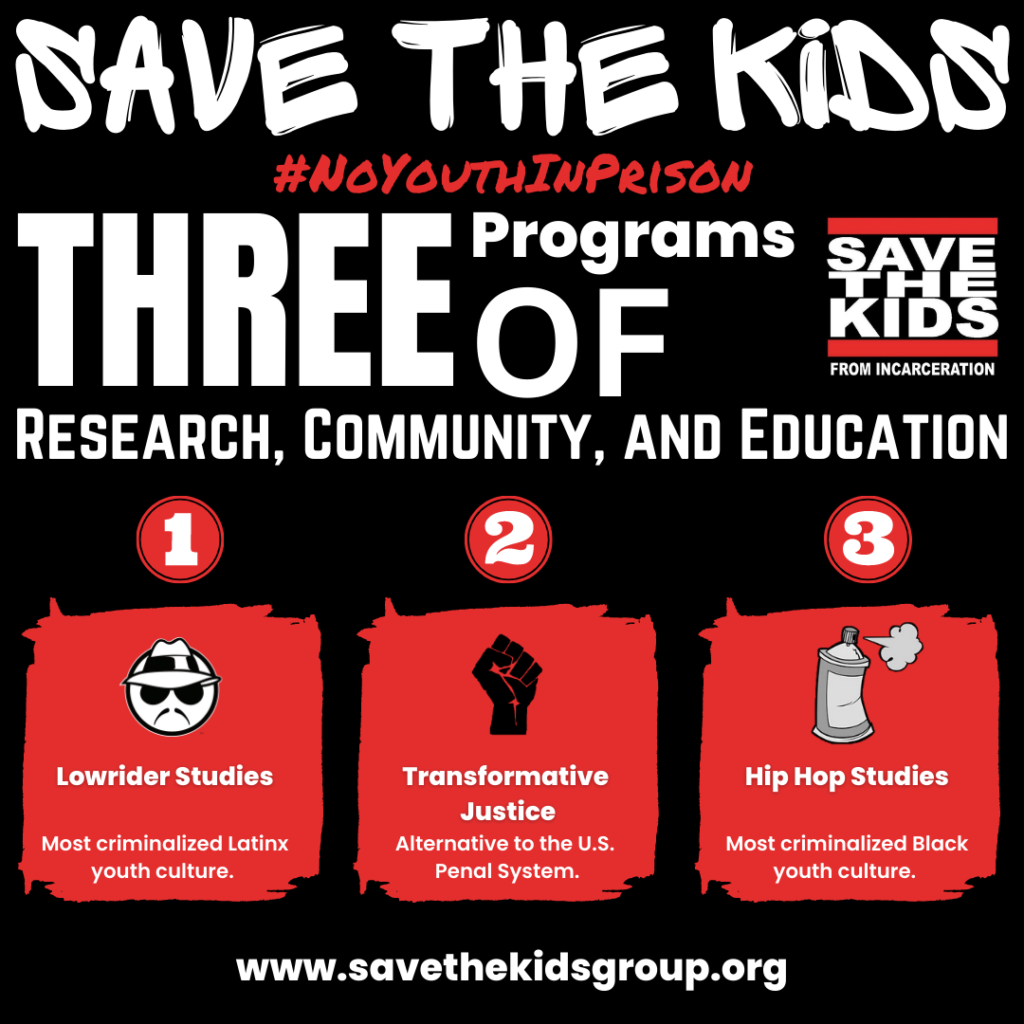Feb 19, 2021 – 7th Annual Transformative Justice and Abolition Criminology
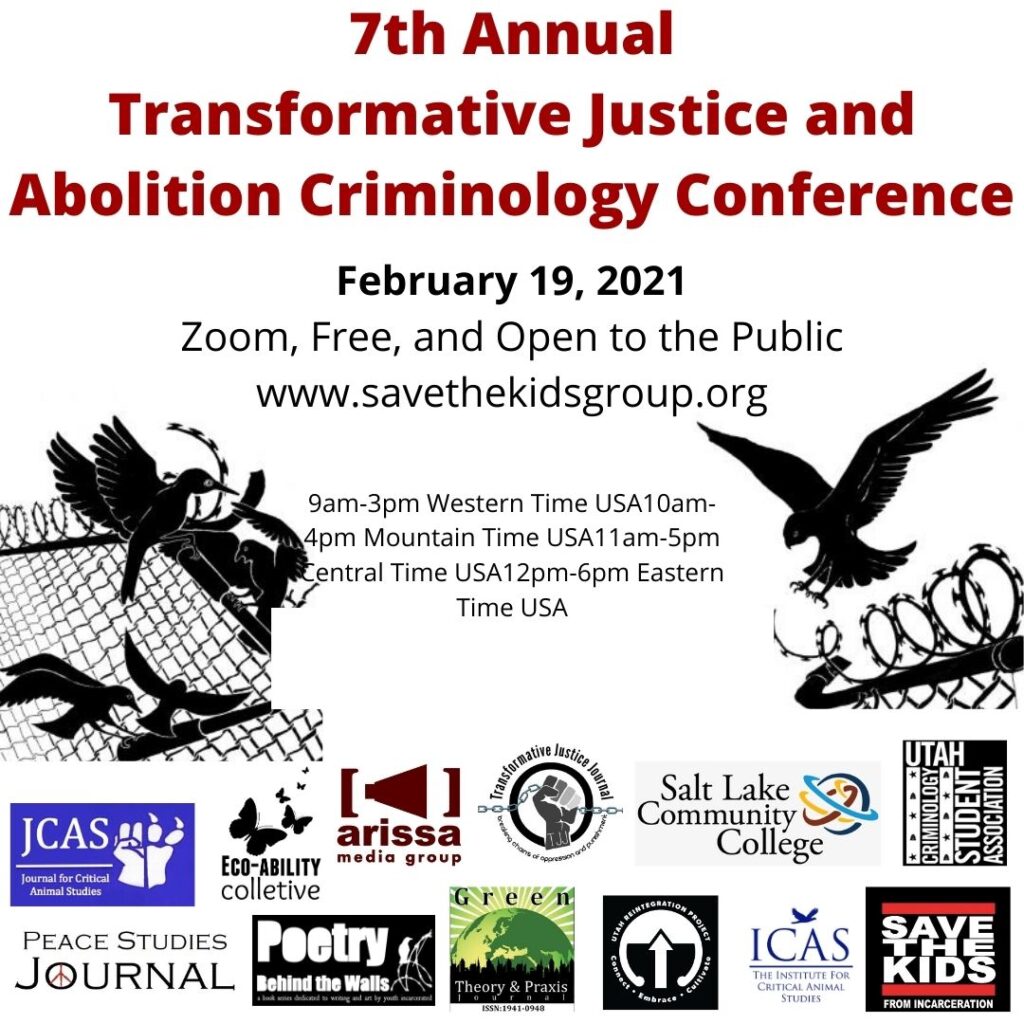
7th Annual Transformative Justice and Abolition Criminology
February 19, 2021
Zoom, Free, and Open to the Public
This conference will be recorded.
Co-Chaired:
Lou Dejesus, Coordinator, Northeast Save the Kids
and
Lucas Dietsche, Coordinator of Prisoner Support and Editor, Transformative Justice Journal
Facilitated by:
Brock M. Smith, Student, Salt Lake Community College
Treasurer, Utah Criminology Student Association
Hosted by:
Xris Macias
Director of Dream Center
University of Utah
Co-sponsored:
University of Utah Dream Center, Save the Kids, Institute for Critical Animal Studies, Salt Lake Community College’ Chief Diversity Office, Utah Reintegration Project, Poetry Behind the Walls, Peace Studies Journal, Journal for Critical Animal Studies, Arissa Media Group, Eco-ability Collective, Utah Criminology Student Association, and Green Theory and Praxis Journal
___________________________________________
Facebook Event Page
Call for Presentations
If you are interested in presenting on transformative justice or abolition criminology please send: (1) title of your presentation, (2) biography of yourself 80-100 words third person one paragraph, and (3) abstract/description of your presentation in one paragraph third person around 200 words long.
Send all of your information above to –
Antonio Quintana antonio.quintana@gmail.com
Deadline January 23, 2021
SCHEDULE
9am-3pm Western Time USA
10am-4pm Mountain Time USA
11am-5pm Central Time USA
12pm-6pm Eastern Time USA
The schedule is based on Mountain USA Time.
1.Each One Teach One
Pastor Shawn Clay, Co- founder of New Beggings Ministries
10:00am-10:20am
Bio: I have been an advocate for the homelessness, those in jails and those released from prisoner the last ten years. I was raised in Syracuse, New York in a single parent household. Left home to go to Job Corp, but I was kicked out six months later. Finding myself with no place to go I was homeless. I ended up doing my first jail bid from age 18 to 19. I dealt many years with homelessness and self medicating addiction and trauma. I came to Utah in 1995, Shortly after my arrival I ended up in Utah State Prison serving a 0-5 sentence. After a couple of years of in and out of prison I made it off of parole. I struggled with finding housing and jobs because of my record as I still do to this day. In 2008, I gave my life to the Lord. Since then I have become and Ordained Pastor, Licensed Minister and Ordained Elder. God blessed me with a beautiful wife in 2016 and in 2019 we started New Beginnings Ministries our 501(C)3 . We serve those out of jail, also those coming out of prison, the homeless, addicted to drugs, and those who are socio-economically struggling.
10:20am-10:30am Q and A
2. Prison Labor in U.S. State Prisons, 1974-2016: New Slavery or Enforced Idleness?
Geert Dhondt & Eric Seligman
10:30am-10:50am
Abstract: Using the Bureau of Justice Statistics’s Survey of Prison Inmates, Geert Dhondt and Eric Seligman analyze levels of work and idleness and categories of prison labor in state prisons throughout the prison boom. They will present the quantitative findings from their recent study and assess the implications for theoretical frameworks including the prison-industrial complex, new slavery, and others. They argue 1) that increasing levels of prison idleness throughout the prison boom add support to the view that imprisonment under neoliberal capitalism represents the state use of force to organize economic abandonment, and 2) the upkeep-dominant prison labor that occurs is not the instrument of profit-seeking corporations as much as it is a system of carceral workfare — or, a set of work obligations to the state in exchange for the carceral welfare of room and board in conditions of non-solitary confinement.
Bio: Geert Dhondt’s teaching and research focuses on the economics of crime and justice. He is particularly interested in the relationship between race in the post-segregation era, the logic of neoliberal capitalism, and the criminal justice system. The National Institute of Justice awarded Geert a grant to study the empirical relationship between prison cycling and crime rates. Geert received a distinguished service award in 2012 and a distinguished teaching award in 2015 at John Jay College, City University of New York where he is an Associate Professor and Chair of the Economics Department. Eric Seligman is a researcher in political economy at John Jay College of Criminal Justice/City University of New York, where he studies the economic functions of imprisonment in the U.S. He coordinated CUNY’s college-in-prison program and he organizes for a challenge to mass incarceration that is grounded in economic justice.
10:50am-11:00am Q and A
3. Unfinished Business: A Memorandum to the United States of America
Brock G. Smith Presenting for Calvin A. Coleman in Louisiana Prison
11:00am-11:20am
Abstract: An open letter to America informing everyone about an egregious civil rights violation that has gone unaddressed for far too long, calling upon the American people to do their civic duty and join our fight for justice.
Bio: I (Calvin A. Coleman) was arrested June 6, 2000 for first degree murder. My first trial resulted in a mistrial, followed by a second trial in which I was convicted of second degree murder. I’m a victim of Louisiana’s racist Jim Crow Jury scheme. I had very little formal education, and most of that included special ed. classes. I basically learned to read by studying law books once I arrived at Louisiana State Penitentiary (aka Louisiana’s last slave plantation). I had always dreamed of learning more about the true Black Condition and how we—Black people—have managed to continue to overcome centuries of oppression in this country. Thanks to people like my esteemed colleague the late Rebecca L. Hensley who sadly passed on November 27, 2020, I have become the “changeseeker” she always envisioned I would be. Her contributions to my political education has made me the person I am today.
11:20am-11:30am Q and A
4. Letters to Prisoners: Perception from Inside and Outside the Walls
Lucas Alan Dietsche
11:30am-11:50am
Abstract: Letter writing is a simple important practice of solidarity. Letter writing creates the social bond that helps the incarcerated person feel part of a non-prison society. The prison abolitionist on the outside is connected to the reality of the U.S. being the largest keeper of people in prison and jail in the world. Prison pen pals can be beneficial to the inside knowledge of incarcerated life. There is a shadow of knowledge of theoretical, methodology, and the pedagogy of letter writing groups and letter writing from the perspective of the formerly incarcerated abolitionist.
Bio: Lucas Alan Dietsche is a graduate with a master’s in criminal justice from University of Wisconsin-Platteville. He is the National Organizer of Letters to Prisoners-Save the Kids. He is also a professor of prison education. He helps send radical propaganda, books, and birthday cards as organizer of Save the Kids Letters to Prisoners Project. He is also currently an Editor of the Poetry Behind the Walls. As the Current Poet Laureate of Taconite Harbor, he has written and published many collections of poetry and novels. He has research on Poetry Criminology, and carceral feminism. He has a patreon account called The Pilot of Oumuamua.
11:50am-12:00pm Q and A
5. Racial Control and Student Labor: An Abolitionist Perspective
Bennett Brazelton, Boston Public Schools
12:00pm-12:20pm
Abstract: The exploitation of labor has occupied a central role in historical analysis of race and racism. In considering schooling as a site of institutional racism, however, the exploitation of student labor is seldom considered seriously. This is all the more surprising given the extent to which school is organized around the efficient extraction of student work, and the amount of thought which goes into maximizing productivity, achievement, and success. Here, I discuss schooling in two ways: first, as an institution of racial control; second, as a structure of labor exploitation. I first discuss problems with dominant scholarship dealing with economic reproduction in schooling, and then highlight the historical dimensions of schooling as a site of racial labor exploitation. Next, I describe the utilities (corporate and social) of student labor in contemporary racial capitalism. Finally, I suggest that looking at schooling as a site of labor exploitation enables us to locate a ‘general strike’––that is, the ways in which students of color refuse and disrupt the daily operations of an oppressive structure. Such an analytic encourages teachers to reimagine classroom management in order to: (1) read student disruption as a radical and political move toward freedom; and (2) cede the means of production of schooling to the students themselves. This is necessary, I argue, in order to produce a truly transformational and liberatory educational space.
12:20am-12:30pm Q and A
6. Correct the Narrative Campaign
Shannon Ross
12:30pm-12:50pm
Abstract: The Community newsletter helps 9,000 incarcerated readers be more informed about issues and policies throughout the DOC and criminal justice nationwide. It also inspires and educates them as they prepare to return to society and helps their loved ones handle the difficulties and confusion of supporting them. Our Correct the Narrative Campaign confronts communities that are more indifferent and antagonistic about people with criminal records and the need for change in how criminal justice is approached.
Bio: Shannnon Ross is the executive director of The Community and a graduate student at UW-Milwaukee. He is also a community fellow with the Wisconsin Decarceration Platform and writer of theinnervoice84 blog. He has written several published articles and is committed to connecting people and organizations involved in the anti-mass incarceration movement in not only WI but nationwide.
12:50pm-1:00pm Q and A
7. Raise Your Pen: A Critical Race Essay on Truth and Justice
Lea Lani Kinikini
1:00pm-1:20am
Abstract: This paper proposes a radical counter-narration of judicial and media representations of Tongan boys and young men in Salt Lake City, Utah, where a moral panic and hypersurveillance/hyper-policing beginning in the late 1980s culminated with the sweeping Grand Jury indictment and Federal government RICO prosecutions of 17 alleged gang members which directly resulted in the judicial murder of Siale M. Angilau on April 21, 2014 which “christened” the new Federal Courthouse in Salt Lake City. The radical counternarration will combine three representative artistic channels, including a video performance by Moana Uluave-Hafoka, illustrations by Kepa Maumau, one of the 17 men prosecuted, and cultural history narration by Lea Lani Kinikini. Mr. Maumau is currently incarcerated at Salt Lake Metro Jail, despite a Federal Judge’s order to be released on May 11th, 2020.
Bio: Dr. Kinikini is currently Chief Diversity Officer at Salt Lake Community College and is co-founder of the Utah Reintegration Project. Moana Uluave-Hafoka is currently a Pasifika Bridge Program Manager at the University of Utah serving as a link between the community college and the University.
Paper authors: Kepa Maumau, Moana Uluave-Hafoka, Lea Lani Kinikini
1:20pm-1:30pm Q and A
8. LWOPCHILD
Ken-Tay Lee
1:30pm-1:50pm
Abstract: I will present my life experience. How I had to change and why goodness was always deep inside me. I am here because I believed that I would be here. I am prepared to be here. Let us now talk about why some things are still the same in the criminal justice system and personally.
Bio: I was born in North Carolina in extreme poverty. I was arrested at the age of fourteen years old and I was later convicted and sentenced to life without parole. I have lived most of my life knowing that I would die in prison with very little or no hope at all in getting out of prison. If I had been born in a different zip code or my family was able to pay for my defense I believe I would not have been convicted. My sentence today would be considered unconstitutional. Let us understand why this happened and how we and the system can and must change.
1:45pm-2:00pm Q and A
9. Practical Abolition: Some Lessons and a Blueprint for Closing Our Prisons?
David Boehnke
2:00pm-2:20pm
Abstract: Abolitionist politics is on the rise, with national prison strikes in 2016 and 2018, and the call to defund and “literally abolish the police” after the George Floyd Uprising. Yet in Minnesota, and elsewhere(?), there is a disturbing disconnect between those most impacted by police and prisons and the abolitionist movement, and significant problems that come from and have generated that disconnect. I believe that through Minnesota based work on technical violations, sex offender civil commitment, and much more, lessons are being learned that can unite the abolitionist movement with those most impacted and in doing so make abolitionist goals more than aspirational.
In this talk I will: 1. Summarize lessons from 6 years of abolitionist co-organizing with prisoners, and increasingly ex-prisoners, families, and impacted communities. 2. Outline what I believe it will take to actually abolish the prison system in the United States, using work in Minnesota as a case study, and drawing upon the restorative justice work of Common Justice.
Bio: David Boehnke is a volunteer organizer, half time high school social studies teacher, and abolitionist. He is a member of the Twin Cities Incarcerated Workers Organizing Committee, Decarcerate MN Coalition, and End MSOP Coalition. He will be speaking from his personal experience, not as a group representative.
2:20pm-2:30pm Q and A
10. The Transformative Power of Education
Matthew Holman
2:30pm-2:50pm
Bio: Matthew Holman was formerly incarcerated and is currently the marketing director at QPilot. “As someone [Matthew Holman] that knows firsthand the impact of education on the incarcerated, Matthew works to expand access to higher education in prison. He’s spoken with lawmakers in Washington, DC several times, and volunteers locally to promote awareness. He works for a tech startup trying to show the world that a criminal past does not define him – or anyone.”
2:50pm-3:00pm Q and A
11. Connecting in Our Communities
Alisha Paige
3:00pm-3:20pm
Abstract: Many times connecting in our communities is hard so, I would love to share examples of how we can get involved with folks through opening up the topics in mixed company and providing services whether its advocacy, food justice, etc.
Bio: Alisha Page is a community advocate for change and passionate about ending mass incarceration. She has volunteered since 2007 working in advocacy for prisoners and their families and the pasty 9 years in reentry. Additionally, she has be an active comrade with Save the Kids originally with Wisdom behind the walls but now active where she is needed. She is currently the Treasurer and a board member. She actively attends juvenile court advocating for families caught up in the system. Ms. Page facilitates equity training for k-12 and often provides guidance for teacher retraining. Ms. Page is a small business owner since 2004 who is passionate about helping in the community. She is an active small business coach for Signature Planning and is passionate about helping small businesses startups and expand. She has been gardening for over fifteen years and actively involved in food justice. Her family and Save the Kids give over 6000 pounds of food to community food banks each year. She believes that food education is especially important when narrowing the educational divide that exists in communities. Good nutrition and education go hand in hand. Ms. Page holds a degree in Psychology concentration in Financial Management and B. A. in Sociology.
3:20pm-3:30pm Q and A
12. Activism: Power to Transform
Ozwald Balfour
3:30pm-3:50pm
Abstract: Once accused, the average individual in America has a very high likelihood that she or he will be convicted and imprisoned. It is estimated that between 90 to 95 percent of all federal and state cases end in a plea bargain. According to the US Department of Justice, only 0.25% of court cases ended in acquittal. The vast majority of appeals are unsuccessful: Fewer than 9 percent of total appeals result in reversals of lower courts. In light of these dismal statistics, lots of organizations and programs are engaged in efforts to transform the Criminal Justice System. ADULLAM JUstice Project, a virtual, grassroots, not-for-profit, non-government Advocacy for Justice and Mercy works in the trenches to aid individuals who are accused and criminally charged to increase their odds of avoiding a conviction. It’s next priority is freeing people who are imprisoned. Today’s presentation focuses on recent undertakings to achieve Transformation of individuals as well as the Criminal Justice System. Results Matter.
Bio: Ozwald Balfour was born and raised on the Caribbean island of Trinidad. He is a retired Media Entrepreneur. Ozwald earned a degree in International Communications: Media & International Politics, from the University of Utah (1984). He was imprisoned by the State of Utah in Draper and Gunnison from March 2016 to November 2020. Ozwald is currently a Citizen Journalist, a member of the National Lawyers Guild and Chief of Volunteer Services for ADULLAM Justice Project
3:50pm-4:00pm Q and A
13. Punk, Hip Hop, and Lowriders Oh My! Alternatives to Incarceration
Anthony J. Nocella II
4:00pm-4:20pm
Abstract: This presentation talks about Save the Kids programs that are the three most criminalized youth cultures – punk, Hip Hop, and lowriders. These cultures have many similarities, which the presentation will discuss, including how each have been criminalized, policed, and repressed. This presentation will talk about the powerful elements of each culture that promotes peace and justice, decolonizing, and non-punitive.
Bio: Anthony J. Nocella II, Ph.D., is an Assistant Professor in the Department of Criminal Justice and Criminology in the Institute of Public Safety at Salt Lake Community College. He is the editor of the Peace Studies Journal, Transformative Justice Journal, and co-editor of five book series including Critical Animal Studies and Theory with Lexington Books and Hip Hop Studies and Activism with Peter Lang Publishing. He is the National Director of Save the Kids and Executive Director of the Institute for Critical Animal Studies. He has published over fifty book chapters or articles and forty books. He has been interviewed by New York Times, Washington Post, Houston Chronicles, Fresno Bee, Fox, CBS, CNN, C-SPAN, and Los Angeles Times.
4:20pm-4:30pm Q and A


